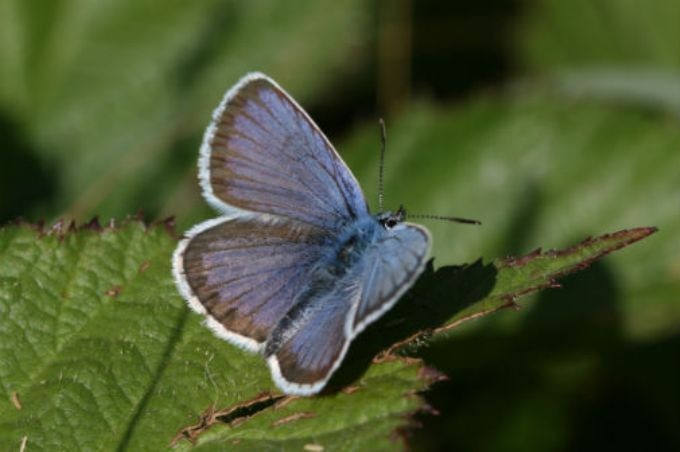Oct 25 2019
Researchers have found out the reason for the decline in the number of some British butterflies and moths, like Silver-studded Blue and High Brown Fritillary butterflies, due to climate change.
 The Silver-studded Blue has retreated southwards and decreased in abundance. (Image credit: Dr Callum Macgregor, University of York)
The Silver-studded Blue has retreated southwards and decreased in abundance. (Image credit: Dr Callum Macgregor, University of York)
A large number of moths and butterflies in Britain have been reacting to warmer temperatures by appearing earlier in the year. Researchers have found for the first time why climate change is leading to winners and losers among species.
According to the scientists, the study outcomes can help conservationists to find butterfly and moth species that are extremely at risk due to climate change.
Shrink in Numbers
A new study by researchers from the University of York has revealed that appearing earlier in the year could be helpful to species that can multiply through several quick breeding cycles each year and are adaptable around their environment (like the Speckled Wood butterfly). This is because they get more time to increase in numbers before winter and extend their range further north.
On the contrary, early appearance could cause habitat specialist species with only a single life cycle in a year to decrease in numbers and vanish from the northern parts of the country within their historical range.
Single-generation, habitat-specialist species (such as the rare High Brown Fritillary butterfly) are at increased risk due to climate change. Scientists suggested that this is because extra breeding time is not advantageous to these species, and appearing earlier may rule them out of seasonal synchrony with limited access to food resources.
Temperature Increases
The scientists examined data on butterflies and moths, provided by citizen scientists to various schemes, including the National Moth Recording Scheme and Butterflies for the New Millennium (which are run by Butterfly Conservation), over a 20 year period from 1995 to 2014 when there was an increase of 0.5° in the average spring temperatures in Britain.
The increase in temperature causes butterflies and moths to appear on average 1–6 days earlier per 10 years during this period of time.
Because butterflies in general are warmth loving, scientists predicted that the range margin of most species would move north as a result of global heating. However this hasn’t happened as widely or as quickly as expected for many species.
Dr Callum Macgregor, Study Lead Author, Department of Biology, University of York
Vulnerable
Callum Macgregor added, “Our study is the first to establish that there is a direct connection between changes in emergence date and impacts on the habitat range of butterflies and moths. This is because emerging earlier has caused some species to decline in abundance, and we know that species tend only to expand their range when they are doing well.”
Our results indicate that while some more flexible species are able to thrive by emerging earlier in the year, this is not the case for many single generation species that are habitat specialists—these species are vulnerable to climate change.
Jane Hill, Professor, Department of Biology, University of York
Jane Hill heads the NERC Highlight project.
Pervasive Impacts
According to study co-author Professor Chris Thomas, from the Leverhulme Centre for Anthropocene Biodiversity at the University of York, “These changes remind us how pervasive the impacts of climate change have already been for the world's biological systems, favouring some species over others. The fingerprint of human-caused climate change is already everywhere we look.”
The study shows that we urgently need to conduct ecological research on threatened butterflies such as the High Brown Fritillary, to see if we can manage land in a new way that can help them adapt to the current negative effects of climate change.
Tom Brereton, Professor, Butterfly Conservation
Source: https://www.york.ac.uk/